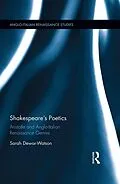The startling central idea behind this study is that the rediscovery of Aristotle's Poetics in the sixteenth century had a profound impact on almost every aspect of Shakespeare's late plays. Re-examining the plays, Dewar-Watson shows how the generic complexity of Shakespeare's late plays is informed by contemporary debates about tragicomedy.
Autorentext
Sarah Dewar-Watson is Honorary Research Fellow at the University of Sheffield, UK.
Inhalt
Introduction
1. The Late Plays and their Genre
1.1 The First Folio, Shakespeare and Genre
1.2 Audiences and 'Dramatic Competence'
1.3 Shakespeare and the Classics
2. Shakespeare and the Reception of the Poetics
2.1 Aristotle's Poetics: A Brief Reception History
2.2 Cinthio
2.3 Fletcher and Guarini
3. Happy-Ending Tragedy
3.1 Tranquilla ultima
3.2 Tragicomedy: A Hybrid Genre
3.3 The Statue Scene and the Alcestis
4. Wonder and Empathy
4.1 Wonder and Spectacle
4.2 Wonder: Some Contemporary Contexts
4.3 Empathy and Audience Response
5. Shakespeare and Catharsis
5.1 Aristotle and the Critical Background
5.2 Catharsis and the English Stage
5.3 Purgation: Politics, Law, Penance
5.4 Cathartic Endings
6. The Odyssey and Island Romance
6.1 The Odyssey as Tragicomic Model
6.2 Shakespeare and the Odyssey
6.3 Literary Nostalgia and Textual Genealogies
Epilogue
